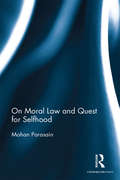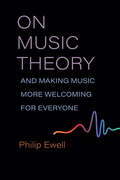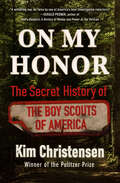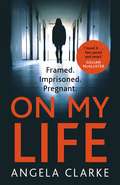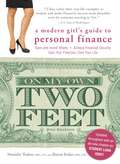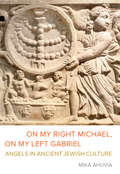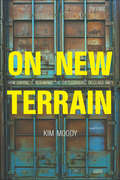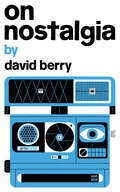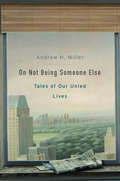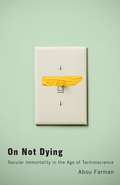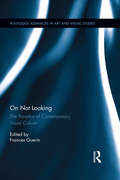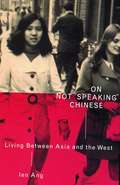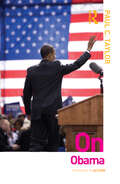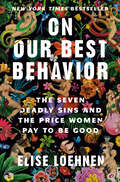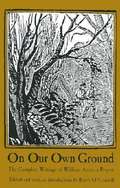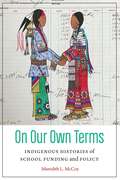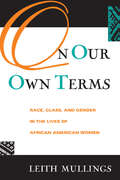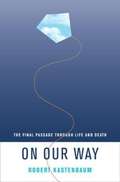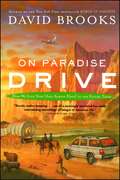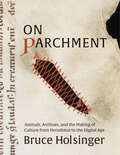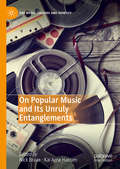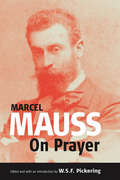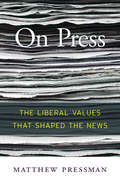- Table View
- List View
On Moral Law and Quest for Selfhood
by Mohan ParasainThis book offers an original intersection of concepts from Immanuel Kant’s moral command ethics and Søren Kierkegaard’s existential ethics. The Kantian formulation of moral law is based on theoretical ground while Kierkegaardian ethics of the quest for selfhood views it as the very act of living. The present work provides an account of both these perspectives and questions whether these approaches to morality are mutually exclusionary. Using Slavoj Žižek’s ‘parallax view’ in the realm of morality, it argues that moral philosophy must engage with a constant critique of ‘difference’ around which the transformation of our various perspectives to morality revolves. This work appeals for furtherance of the conversation model and participation of perspectives to transcend ‘positional confinement’. It advocates the traversing of the ethical parallax to allow for intellectual openness and an empathetic perception of the ‘other’. Engaging and well-researched, this book will be of interest to scholars and researchers of ethics, political philosophy and continental philosophy.
On Music Theory, and Making Music More Welcoming for Everyone (Music and Social Justice)
by Philip EwellSince its inception in the mid-twentieth century, American music theory has been framed and taught almost exclusively by white men. As a result, whiteness and maleness are woven into the fabric of the field, and BIPOC music theorists face enormous hurdles due to their racial identities. In On Music Theory, Philip Ewell brings together autobiography, music theory and history, and theory and history of race in the United States to offer a black perspective on the state of music theory and to confront the field’s white supremacist roots. Over the course of the book, Ewell undertakes a textbook analysis to unpack the mythologies of whiteness and western-ness with respect to music theory, and gives, for the first time, his perspective on the controversy surrounding the publication of volume 12 of the Journal of Schenkerian Studies. He speaks directly about the antiblackness of music theory and the antisemitism of classical music writ large and concludes by offering suggestions about how we move forward. Taking an explicitly antiracist approach to music theory, with this book Ewell begins to create a space in which those who have been marginalized in music theory can thrive.
On My Honor: The Secret History of the Boy Scouts of America
by Kim ChristensenFrom a Pulitzer Prize winning journalist, the shocking rise and fall of an American institution. Since its founding in 1910, the Boy Scouts of America has been the nation&’s premier youth organization, espousing self-reliance and honor. More than 100 million Americans have been Boy Scouts, from Bill Gates to Martin Luther King Jr. Today, however, Scouting faces an existential threat of its own making: more than 82,000 former Scouts have filed claims alleging they were sexually abused—seven times the number of similar allegations that rocked the Catholic Church two decades ago. On My Honor untangles the full story of the Boy Scouts of America, tracking its creation, growth, influence, and the massive generational trauma it has caused. Using the iconic institution to tell a story of American values over the last century, the book grapples with America&’s changing understanding of what it means to &“make men.&” This riveting story of power and abuse, religion and politics, scandal and justice, is brought to life by groundbreaking research and an unforgettable cast of characters.
On My Life: the gripping fast-paced thriller with a killer twist
by Angela Clarke'A compelling, vividly realised prison drama with a mystery at its heart. Hugely enjoyed it' Steve Cavanagh, author of Thirteen Jenna knows she didn't do it. But she is running out of time to prove it . . . A heartbreaking, compulsive thriller with a killer twist! Framed. Imprisoned. Pregnant. Jenna thought she had the perfect life: a loving fiancé, a great job, a beautiful home. Then she finds her stepdaughter murdered; her partner missing. And the police think she did it . . . Locked up to await trial, surrounded by prisoners who'd hurt her if they knew what she's accused of, certain someone close to her has framed her, Jenna knows what she needs to do: Clear her name Save her baby Find the killer But can she do it in time? Authors love On My Life! 'An angry, powerful read' Mick Herron, author of London Rules 'I loved it. A searing take on the treatment of women in prison as well as a fast-paced and smart thriller' Gillian McAllister, author of No Further Questions 'What an amazing, roller-coaster ride and also a searing indictment of the way women are treated in prison. Highly recommended' Elly Griffiths, author of The Stranger Diaries 'A compelling, vividly realised prison drama with a mystery at its heart. Hugely enjoyed it' Steve Cavanagh, author of Thirteen It's her best yet. ON MY LIFE is a claustrophobic helter skelter that had me racing to the end to find out who was telling the truth' Katerina Diamond, author of The Promise 'Intelligent, pacy thriller... Taut, claustrophobic, fast-paced, moving. An incredibly gripping read' Will Dean, author of Dark Pines 'Compelling, intense, and breathtakingly brilliant' Angela Marsons, author of the DI Kim Stone novels'Loved this... The pace never drops and the detail of prison life is so moving and brutal' Claire McGowan, author of What You Did Readers love On My Life! 'Great plot, brilliant writing as always. Highly recommend!' 5* Amazon review 'If you want a book you can't stop reading then this is the book for you.' 5* Amazon review 'I didn't see the twist coming! A truly excellent and memorable read.' 5* Amazon review 'A thrilling read that draws you in from the off and doesn't let you go!' 5* Amazon review
On My Life: the gripping fast-paced thriller with a killer twist
by Angela ClarkeWhen a pregnant woman is imprisoned on suspicion of murder, she must fight to prove her innocence from behind bars or her baby may be given away to whoever framed her...Framed. Imprisoned. Pregnant. It's her worst nightmare...Jenna Burns thought she had the perfect life: a loving fiancé, a great job, a beautiful home. Then she returns home one day to find her stepdaughter murdered; her partner missing.And the police think it was her...Jenna knows she's been framed. But how can she prove it from behind bars? And then she finds out she is pregnant. It's not only her life at stake. Surrounded by prisoners who'd hurt her if they knew what she's accused of; aware that someone outside hates her enough to kill; Jenna will do whatever it takes to clear her name, save her baby, and find out the truth. But can she do it in time? (P)2019 Hodder & Stoughton Limited
On My Own Two Feet: A Modern Girl's Guide to Personal Finance
by Manisha ThakorMost young women would love to live a carefree lifestyle filled with lunches, Louis Vuitton, and lattes, but what you might not know is that doing so can lead to future financial breakdown.Whether you've been living paycheck-to-paycheck, are trying to save for a down payment on your first home, or are hoping to one day retire in comfort, On My Own Two Feet teaches you how to balance your desire to live well today with the need to save and invest for tomorrow. This lively, no-nonsense financial guide explains:How much of your income to saveHow to avoid the perils of credit card debtHow to create a budget you can live with (and still have fun!)How to invest widely using a keep-it-simple planHow to deal with real-life situations The sooner you apply the financial concepts highlighted by Manisha Thakor and Sharon Kedar, the more likely you'll achieve common life goals--all free from financial stress.
On My Right Michael, On My Left Gabriel: Angels in Ancient Jewish Culture
by Mika AhuviaAngelic beings can be found throughout the Hebrew Bible, and by late antiquity the archangels Michael and Gabriel were as familiar as the patriarchs and matriarchs, guardian angels were as present as one’s shadow, and praise of the seraphim was as sacred as the Shema prayer. Mika Ahuvia recovers once-commonplace beliefs about the divine realm and demonstrates that angels were foundational to ancient Judaism. Ancient Jewish practice centered on humans' relationships with invisible beings who acted as intermediaries, role models, and guardians. Drawing on non-canonical sources—incantation bowls, amulets, mystical texts, and liturgical poetry—Ahuvia shows that when ancient men and women sought access to divine aid, they turned not only to their rabbis or to God alone but often also to the angels. On My Right Michael, On My Left Gabriel spotlights these overlooked stories, interactions, and rituals, offering a new entry point to the history of Judaism and the wider ancient Mediterranean and Near Eastern world in which it flourished.
On New Terrain: How Capital Is Reshaping the Battleground of Class War
by Kim Moody“A detailed and provocative study of how capital has changed since the 1980s and its effects on the working class and political parties in the USA.” —Scottish Left ReviewOn New Terrain challenges conventional wisdom about a disappearing working class and the inevitability of a two-party political structure as the only framework for struggle. Through in-depth study of the economic and political shifts at the top of society, Moody shows how recent developments in capitalist production impact the working class and its power to resist the status quo. He argues that this transformed industrial terrain offers new possibilities for organization in the workplace and opens doors for grassroots, independent political action strengthened by reemerging labor and social movements.From the logistics revolution to the unprecedented concentration of business and wealth in the hands of the one percent, On New Terrain examines the impact of the current economic terrain on the working class in the United States. Looking beyond the clichés of precarity and the gig economy, Moody shows that the working class and its own self-activity are essential in the global battle against austerity.“[A] masterful and much-needed book.” —Solidarity“Immediately shakes the reader by offering a hard hitting, concrete and sober analysis of the transformation of both the capitalist and working classes of the USA.” —Bill Fletcher, Jr., coauthor of Solidarity Divided“He explodes myths about the gig economy and the potential to transform the Democratic Party. Readers will put the book down convinced that there is a way for workers to win.” —LaborNotes
On Nostalgia
by David BerryFrom movies to politics, social media posts to the targeted ads between them, nostalgia is one of the most potent forces of our era. On Nostalgia is a panoramic cultural history of nostalgia, exploring how a force that started as a psychological diagnosis of soldiers fighting far from home has come become a quintessentially modern condition. Drawing on everything from the modern science of memory to the romantic ideals of advertising, and traversing cultural movements from futurism to fascism to Facebook, cultural critic David Berry examines how the relentless search for self and overwhelming presence of mass media stokes the fires of nostalgia, making it as inescapable as it is hard to pin down. Holding fast against the pull of the past while trying to understand what makes the fundamental impossibility of return so appealing, On Nostalgia explores what it means to remember, how the universal yearning is used by us and against us, and it considers a future where the past is more readily available and easier to lose track of than ever before.
On Not Being Someone Else: Tales of Our Unled Lives
by Andrew H. MillerA captivating book about the emotional and literary power of the lives we might have lived had our chances or choices been different. We each live one life, formed by paths taken and untaken. Choosing a job, getting married, deciding on a place to live or whether to have children—every decision precludes another. But what if you’d gone the other way? It can be a seductive thought, even a haunting one. Andrew H. Miller illuminates this theme of modern culture: the allure of the alternate self. From Robert Frost to Sharon Olds, Virginia Woolf to Ian McEwan, Jane Hirshfield to Carl Dennis, storytellers of every stripe write of the lives we didn’t have. What forces encourage us to think this way about ourselves, and to identify with fictional and poetic voices speaking from the shadows of what might have been? Not only poets and novelists, but psychologists and philosophers have much to say on this question. Miller finds wisdom in all these sources, revealing the beauty, the power, and the struggle of our unled lives. In an elegant and provocative rumination, he lingers with other selves, listening to what they say. Peering down the path not taken can be frightening, but it has its rewards. On Not Being Someone Else offers the balm that when we confront our imaginary selves, we discover who we are.
On Not Dying: Secular Immortality in the Age of Technoscience
by Abou FarmanAn ethnographic exploration of technoscientific immortality Immortality has long been considered the domain of religion. But immortality projects have gained increasing legitimacy and power in the world of science and technology. With recent rapid advances in biology, nanotechnology, and artificial intelligence, secular immortalists hope for and work toward a future without death.On Not Dying is an anthropological, historical, and philosophical exploration of immortality as a secular and scientific category. Based on an ethnography of immortalist communities—those who believe humans can extend their personal existence indefinitely through technological means—and an examination of other institutions involved at the end of life, Abou Farman argues that secular immortalism is an important site to explore the tensions inherent in secularism: how to accept death but extend life; knowing the future is open but your future is finite; that life has meaning but the universe is meaningless. As secularism denies a soul, an afterlife, and a cosmic purpose, conflicts arise around the relationship of mind and body, individual finitude and the infinity of time and the cosmos, and the purpose of life. Immortalism today, Farman argues, is shaped by these historical and culturally situated tensions. Immortalist projects go beyond extending life, confronting dualism and cosmic alienation by imagining (and producing) informatic selves separate from the biological body but connected to a cosmic unfolding.On Not Dying interrogates the social implications of technoscientific immortalism and raises important political questions. Whose life will be extended? Will these technologies be available to all, or will they reproduce racial and geopolitical hierarchies? As human life on earth is threatened in the Anthropocene, why should life be extended, and what will that prolonged existence look like?
On Not Looking: The Paradox of Contemporary Visual Culture (Routledge Advances in Art and Visual Studies)
by Frances GuerinOn Not Looking: The Paradox of Contemporary Visual Culture focuses on the image, and our relationship to it, as a site of "not looking." The collection demonstrates that even though we live in an image-saturated culture, many images do not look at what they claim, viewers often do not look at the images, and in other cases, we are encouraged by the context of exhibition not to look at images. Contributors discuss an array of images—photographs, films, videos, press images, digital images, paintings, sculptures, and drawings—from everyday life, museums and galleries, and institutional contexts such as the press and political arena. The themes discussed include: politics of institutional exhibition and perception of images; censored, repressed, and banned images; transformations to practices of not looking as a result of new media interventions; images in history and memory; not looking at images of bodies and cultures on the margins; responses to images of trauma; and embodied vision.
On Not Speaking Chinese: Living Between Asia and the West
by Ien AngIn this major new book, leading cultural thinker Ien Ang engages with urgent questions of identity in an age of globalisation and diaspora. The starting point for Ang's discussion is the experience of visiting Taiwan. Ang, a person of Chinese descent, born in Indonesia and raised in the Netherlands, found herself "faced with an almost insurmountable difficulty" - surrounded by people who expected her to speak to them in Chinese. She writes: "It was the beginning of an almost decade-long engagement with the predicaments of `Chineseness' in diaspora. In Taiwan I was different because I couldn't speak Chinese; in the West I was different because I looked Chinese". From this autobiographical beginning, Ang goes on to reflect upon tensions between `Asia' and `the West' at a national and global level, and to consider the disparate meanings of `Chineseness' in the contemporary world. She offers a critique of the increasingly aggressive construction of a global Chineseness, and challenges Western tendencies to equate `Chinese' with `Asian' identity. Ang then turns to `the West', exploring the paradox of Australia's identity as a `Western' country in the Asian region, and tracing Australia's uneasy relationship with its Asian neighbours, from the White Australia policy to contemporary multicultural society. Finally, Ang draws together her discussion of `Asia' and `the West' to consider the social and intellectual space of the `in-between', arguing for a theorising not of `difference' but of `togetherness' in contemporary societies.
On Obama (Thinking in Action)
by Paul C. TaylorOn Obama examines some of the key philosophical questions that accompany the historic emergence of the 44th US president. The purpose of this book is to take seriously the once common thought that the Obama presidency had ushered in a post-historical age. Three questions organize the argument of the book: What’s living and dead in the idea of post-racialism? Did Mr. Obama’s preference for problem-solving over ideological warfare mark him not just as a post-partisan figure but as a philosophical pragmatist? Did the US become post-imperial when the descendants of slaves and of British imperial subjects inhabited the White House? In addition to taking up these questions, the book considers Mr. Obama’s own relationship to the post-historical idea and explores the ethical implications of certain ways of entertaining that idea.
On Othering: Processes and Politics of Unpeace (Global Peace Studies)
by Yasmin Saikia Chad HainesIn every sphere of life, division and intolerance has polarized communities and entire nations. The learned construction of the Other—an evil “enemy” against whom both physical and discursive violence is deemed acceptable—has fractured humanity, creating divisions that seemingly defy reconciliation. How do we restore the bonds of connection among human beings? How do we shift from polarization to peace? On Othering: Processes and Politics of Unpeace examines the process of othering from an international perspective and considers how it undermines peacemaking and is perpetuated by colonialism and globalization. Taking a humanistic approach, contributors argue that celebrating difference can have a transformative change in seeking peaceful solutions to problems created by people, institutions, ideas, conditions, and circumstances. Touching on race, gender, sexuality, nationalism, and our relationship with the natural world, this volume attends to the deep injustices brought about by othering and recommends actions for mending the relationships that are essential to renewing the possibility of peace.
On Our Best Behavior: The Seven Deadly Sins and the Price Women Pay to Be Good
by Elise LoehnenNEW YORK TIMES BESTSELLER • A groundbreaking exploration of the ancient rules women unwittingly follow in order to be considered &“good,&” revealing how the Seven Deadly Sins still control and distort our lives and illuminating a path toward a more balanced, spiritually complete way to liveWhy do women equate self-denial with being good? We congratulate ourselves when we resist the donut in the office breakroom. We celebrate our restraint when we hold back from sending an email in anger. We feel virtuous when we wake up at dawn to get a jump on the day. We put others&’ needs ahead of our own and believe this makes us exemplary. In On Our Best Behavior, journalist Elise Loehnen explains that these impulses—often lauded as unselfish, distinctly feminine instincts—are actually ingrained in us by a culture that reaps the benefits, via an extraordinarily effective collection of mores known as the Seven Deadly Sins. Since being codified by the Christian church in the fourth century, the Seven Deadly Sins—pride, greed, lust, envy, gluttony, wrath, and sloth—have exerted insidious power. Even today, in our largely secular, patriarchal society, they continue to circumscribe women&’s behavior. For example, seeing sloth as sinful leads women to deny themselves rest; a fear of gluttony drives them to ignore their appetites; and an aversion to greed prevents them from negotiating for themselves and contributes to the 55 percent gender wealth gap. In On Our Best Behavior, Loehnen reveals how we&’ve been programmed to obey the rules represented by these sins and how doing so qualifies us as &“good.&” This probing analysis of contemporary culture and thoroughly researched history explains how women have internalized the patriarchy, and how they unwittingly reinforce it. By sharing her own story and the spiritual wisdom of other traditions, Loehnen shows how we can break free and discover the integrity and wholeness we seek.
On Our Own Ground: The Complete Writings Of William Apess, A Pequot (Native Americans Of The Northeast)
by William Apess Barry O'ConnellThis book brings together all of the known writings of William Apess, a Native American of mixed Pequot and white parentage who fought for the United States in the War of 1812, became a Methodist minister in 1829, and championed the rights of the Mashpee tribe on Cape Cod in the 1830s. Apess's A Son of the Forest, originally published in 1829, was the first extended autobiography by an American Indian. Readable and engaging, it is not only a rare statement by a Native American, but also an unusually full document in the history of New England native peoples. Another piece in the collection, The Experiences of Five Christian Indians of the Pequo[d] Tribe (1833), concludes with an eloquent and unprecedented attack on Euro-American racism entitled "An Indian's Looking-Glass for the White Man." Also included are Apess's account of the "Mashpee Revolt" of 1833-34, when the Native Americans of Mashpee petitioned the government of Massachusetts for the right to elect their own representatives, and his Eulogy on King Philip, an address delivered in Boston in 1836 to mark the 160th anniversary of King Philip's War. In his extensive introduction to the volume, Barry O'Connell reconstructs the story of Apess's life, situates him in the context of early nineteenth-century Pequot society, and interprets his writings both as a literary act and as an expression of emerging Native American politics.
On Our Own Terms: Indigenous Histories of School Funding and Policy (Indigenous Education)
by Meredith McCoyOn Our Own Terms contextualizes recent federal education legislation against the backdrop of two hundred years of education funding and policy to explore two critical themes: the racial and settler colonial dynamics that have shaped Indian education and an equally long and persistent tradition of Indigenous peoples engaging schools, funding, and policy on their own terms. Focusing primarily on the years 1819 to 2018, Meredith L. McCoy provides an interdisciplinary, methodologically expansive look into the ways federal Indian education policy has all too often been a tool for structural violence against Native peoples. Of particular note is a historical budget analysis that lays bare inconsistencies in federal support for Indian education and the ways funds become a tool for redefining educational priorities. McCoy shows some of the diverse strategies families, educators, and other community members have used to creatively navigate schooling on their own terms. These stories of strategic engagement with schools, funding, and policy embody what Gerald Vizenor has termed survivance, an insistence of Indigenous presence, trickster humor, and ironic engagement with settler structures. By gathering these stories together into an archive of survivance stories in education, McCoy invites readers to consider ongoing patterns of Indigenous resistance and the possibilities for bending federal systems toward community well-being.
On Our Own Terms: Race, Class, and Gender in the Lives of African-American Women
by Leith MullingsThis volume utilizes the cross-cultural, historical and ethnographic perspective of anthropology to illuminate the intrinsic connections of race, class and gender. The author begins by discussing the manner in which her experience as a participant observer led her to research and write about various aspects of African-American women's experiences. She goes on to provide a critical analysis of the new scholarship on African-American women, and explores issues of race, class and gender in the arenas of work, kinship and resistance.
On Our Way: The Final Passage Through Life and Death
by Robert Kastenbaum"How do our ideas about dying influence the way we live? Life has been envisioned as a journey, the river of time carrying us inexorably toward the unknown country - and in our day we increasingly turn to myth and magic, ritual and virtual reality, cloning and cryostasis in the hope of eluding the reality of the inevitable end. In this book a preeminent writer on death and dying proposes a new way of understanding our last transition. A fresh exploration of the final passage through life and perhaps through death, his work interweaves historical and contemporary experiences and reflections to demonstrate that we are always on our way. Drawing on a range of observations -- from psychology, anthropology, religion, biology, and personal experience -- Robert Kastenbaum re-envisions life's forward-looking progress, from early-childhood bedtime rituals to the many small rehearsals we stage for our final separation."--BOOK JACKET. Title Summary field provided by Blackwell North America, Inc. All Rights Reserved
On Paradise Drive: How We Live Now (and Always Have) in the Future Tense
by David BrooksThe author of the acclaimed bestseller Bobos in Paradise, which hilariously described the upscale American culture, takes a witty look at how being American shapes us, and how America's suburban civilization will shape the world's future. Take a look at Americans in their natural habitat. You see suburban guys at Home Depot doing that special manly, waddling walk that American men do in the presence of large amounts of lumber; super-efficient ubermoms who chair school auctions, organize the PTA, and weigh less than their children; workaholic corporate types boarding airplanes while talking on their cell phones in a sort of panic because they know that when the door closes they have to turn their precious phone off and it will be like somebody stepped on their trachea. Looking at all this, you might come to the conclusion that we Americans are not the most profound people on earth. Indeed, there are millions around the world who regard us as the great bimbos of the globe: hardworking and fun, but also materialistic and spiritually shallow. They've got a point. As you drive through the sprawling suburbs or eat in the suburban chain restaurants (which if they merged would be called Chili's Olive Garden Hard Rock Outback Cantina), questions do occur. Are we really as shallow as we look? Is there anything that unites us across the divides of politics, race, class, and geography? What does it mean to be American? Well, mentality matters, and sometimes mentality is all that matters. As diverse as we are, as complacent as we sometimes seem, Americans are united by a common mentality, which we have inherited from our ancestors and pass on, sometimes unreflectingly, to our kids. We are united by future-mindedness. We see the present from the vantage point of the future. We are tantalized, at every second of every day, by the awareness of grand possibilities ahead of us, by the bounty we can realize just over the next ridge. This mentality leads us to work feverishly hard, move more than any other people on earth, switch jobs, switch religions. It makes us anxious and optimistic, manic and discombobulating. Even in the superficiality of modern suburban life, there is some deeper impulse still throbbing in the heart of average Americans. That impulse is the subject of this book.
On Parchment: Animals, Archives, and the Making of Culture from Herodotus to the Digital Age
by Bruce HolsingerA sweeping exploration of the shaping role of animal skins in written culture and human imagination over three millennia &“Richly detailed and illustrated. . . . An engaging exploration of book history.&”—Kirkus Reviews For centuries, premodern societies recorded and preserved much of their written cultures on parchment: the rendered skins of sheep, cows, goats, camels, deer, gazelles, and other creatures. These remains make up a significant portion of the era&’s surviving historical record. In a study spanning three millennia and twenty languages, Bruce Holsinger explores this animal archive as it shaped the inheritance of the Euro-Mediterranean world, from the leather rolls of ancient Egypt to the Acts of Parliament in the United Kingdom. Holsinger discusses the making of parchment past and present, the nature of the medium as a biomolecular record of faunal life and environmental history, the knotty question of &“uterine vellum,&” and the imaginative role of parchment in the works of St. Augustine, William Shakespeare, and a range of Jewish rabbinic writers of the medieval era. Closely informed by the handicraft of contemporary makers, painters, and sculptors, the book draws on a vast array of sources—codices and scrolls, documents and ephemera, works of craft and art—that speak to the vitality of parchment across epochs and continents. At the center of On Parchment is the vexed relationship of human beings to the myriad slaughtered beasts whose remains make up this vast record: a relationship of dominion and compassion, of brutality and empathy.
On Popular Music and Its Unruly Entanglements: Blurring The Lines (Pop Music, Culture and Identity)
by Nick Braae Kai Arne HansenOn Popular Music and Its Unruly Entanglements comprises eleven essays that explore the myriad ways in which popular music is entwined within social, cultural, musical, historical, and media networks. The authors discuss genres as diverse as mainstream pop, hip hop, classic rock, instrumental synthwave, video game music, amateur ukelele groups, and audiovisual remixes, while also considering the music’s relationship to technological developments, various media and material(itie)s, and personal and social identity. The collection presents a range of different methodologies and theoretical positions, which results in an eclecticism that aptly demonstrates the breadth of contemporary popular music research. The chapters are divided into three major sections that address: wider theoretical and analytical issues (“Broad Strokes”), familiar repertoire or concepts from a new perspective (“Second Takes”), and the meanings to arise from music’s connections with other media forms (“Audiovisual Entanglements”).
On Prayer
by W.S.F. Pickering Marcel MaussMarcel Mauss (1872-1950) never completed his Doctoral thesis on prayer. Yet his scarcely mentioned introduction (Books I and II) of 176 pages and privately printed in 1909, can be seen as some of his most important work. His argument that much of prayer is a social act will be of great interest to anthropologists, sociologists and theologians.<P><P> Here, the first English translation to be published, is preceded by a general introduction by W.S.F.Pickering and finally a specific commentary on Mauss's use of ethnographic material.
On Press: The Liberal Values That Shaped the News
by Matthew PressmanAs Matthew Pressman’s timely history reveals, during the turbulent 1960s and 70s the core values that held the news industry together broke apart and the distinctive characteristics of contemporary American print journalism emerged. Simply reporting the facts was no longer enough as reporters recognized a need to interpret events for their readers.
